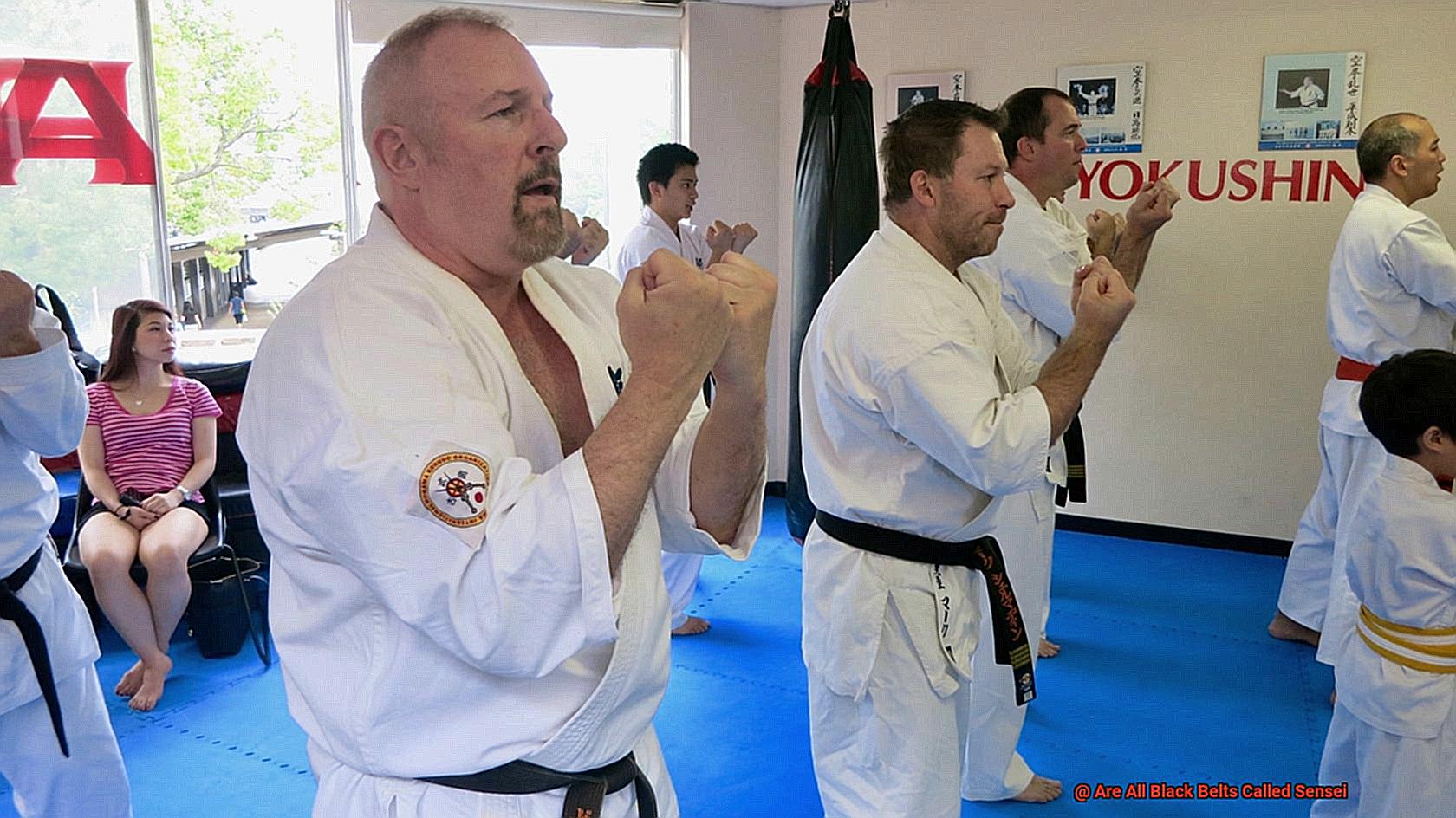
Are you a black belt on the hunt for new knowledge and skills? Or perhaps you’re simply intrigued by the use of “sensei” in the martial arts community.
Well, get ready to expand your understanding because today we’re delving into the question: are all black belts referred to as sensei? This title holds a rich history and carries significant meaning, beyond just a label.
So let’s explore its roots in Japan and how it has evolved in modern times. Put on your gi and join me in uncovering the true essence of being a sensei.
Let’s begin this journey together.
Are All Black Belts Called Sensei?
Contents
- 1 Are All Black Belts Called Sensei?
- 2 The Role of Rank and Certification in Earning the Title of “Sensei”
- 3 Cultural and Regional Differences in the Use of Titles for Black Belts
- 4 The Significance and Importance of Respect in the Martial Arts Community
- 5 Exploring Other Titles Used for Instructors in Martial Arts Schools
- 6 How the Term “Sensei” Extends Beyond Martial Arts into Other Professions
- 7 Conclusion
As a martial arts expert with years of experience in various disciplines, I have come across the term “sensei” countless times. In traditional Japanese martial arts, it is commonly used to refer to a black belt instructor or teacher. However, through my research and personal experiences, I have come to realize that not all black belts are called sensei. In this blog post, we will explore the usage of the term “sensei” in different styles and organizations and discuss why it may not apply to all black belts.
The Evolution of “Sensei”
In traditional Japanese culture, the term “sensei” is used to address anyone who is considered an expert or master in their field. In martial arts, it is a title of respect and honor given to those who have reached a high level of mastery in their art. This title is not exclusive to black belts and can also be used for other ranks such as brown belts or even lower.
However, as martial arts have evolved and spread across the globe, the usage of the term “sensei” has also evolved. With the rise of mixed martial arts (MMA) and other non-traditional styles, the significance of the title has diminished. In these disciplines, the title of sensei may not hold as much weight as it does in traditional Japanese martial arts.
Different Styles, Different Practices
The use of the term “sensei” varies greatly depending on the martial arts style or organization. Some may use it more strictly for higher ranks, while others may use it more loosely for any instructor. For example, in Brazilian Jiu-Jitsu, only black belt holders who have completed additional training and certification are referred to as sensei. In contrast, in Karate or Taekwondo schools, any instructor may be called sensei regardless of their rank or level of experience. This can be confusing for those not familiar with the customs and traditions of a specific style.
Personal Preferences
Another factor that affects the use of the term “sensei” is the individual’s personal preference. Some black belts may not want to be addressed as “sensei” and instead prefer to be called “coach” or “instructor.” This is often seen in modern martial arts schools where traditional titles are not emphasized.
The Importance of Cultural Context
Martial arts is a diverse and complex world, with each style having its own unique set of traditions, techniques, and philosophies. One aspect that sets different styles apart is the use of titles for instructors. From “sensei” in Karate to “sifu” in Kung Fu, these titles hold great significance and reflect the deep-rooted traditions and respect within each style.
Let’s take a closer look at the different styles of martial arts and their use of titles for instructors.
Karate:
Karate, one of the most popular styles of martial arts, uses the term “sensei” for all black belt instructors. This term translates to “teacher” or “master” and is deeply ingrained in Japanese culture. In Karate, this title is earned through years of training, dedication, and expertise.
Tae Kwon Do:
In Tae Kwon Do, a Korean martial art known for its dynamic kicking techniques, black belt instructors are referred to as “master.” This title also holds great significance, as it signifies mastery and respect for the instructor’s skill and experience.
Judo:
Judo, a Japanese martial art focused on throwing and grappling techniques, uses the term “sensei” for all black belt instructors. However, in some organizations, higher-ranking black belt holders may be referred to as “master,” reflecting their elevated level of expertise.
Kung Fu:
Kung Fu, a Chinese martial art known for its fluid movements and diverse techniques, uses the term “sifu” for instructors. This term translates to “teacher” or “master,” similar to “sensei” in Karate. In Kung Fu, this title is used for both male and female instructors.

Aikido:
In Aikido, a Japanese martial art focused on harmonizing with an opponent’s energy, the term “sensei” is used for all black belt instructors. However, some organizations may also use the term “shihan,” which translates to “master instructor.”
Cultural Origins:
It is important to note that the titles used in each style are deeply tied to their cultural origins. Karate, Tae Kwon Do, and Judo all have roots in Japanese culture, while Kung Fu is rooted in Chinese culture. This is reflected in the use of Japanese and Chinese terms for instructors.
The Role of Rank and Certification in Earning the Title of “Sensei”
When it comes to martial arts, the title of “sensei” holds a special place in the hearts and minds of practitioners. It is a term that denotes respect, honor, and expertise. But what exactly does it take to earn this revered title? Is it solely based on rank and certification? Let’s delve deeper into the role of rank and certification in earning the title of “sensei” and how it differs among different martial arts schools and styles.
Origins of the Term “Sensei”
The term “sensei” originated in Japan and is commonly used to refer to a teacher or mentor in various fields, including martial arts. In traditional Japanese martial arts, the title of “sensei” is usually reserved for those who have achieved the rank of black belt or higher. However, this is not a universal rule as some schools or styles may have their own specific titles for instructors, such as “sifu” in Chinese martial arts.
The Influence of Western Culture
In Western culture, the title of “sensei” is often used more loosely and can be given to instructors of any rank in martial arts. This is due to the influence of popular media and the desire to show respect to instructors. However, this can sometimes blur the lines between experience and expertise.
Titles in Different Styles
In some cases, the title of “sensei” may also be given to someone who has reached a certain level of mastery or expertise in a particular field, not necessarily martial arts. Additionally, the use of titles in martial arts can vary depending on the style or lineage. For example, in Brazilian Jiu-Jitsu, the title of “professor” is often used instead of “sensei” for instructors.
Importance Placed on Rank and Certification
The importance placed on rank and certification in earning the title of “sensei” can vary greatly among different martial arts schools and styles. Some schools may prioritize rank and certification as a way to show experience and knowledge, while others may place more emphasis on practical skills and teaching abilities.
Cultural and Regional Differences in the Use of Titles for Black Belts
In the world of martial arts, the title of “sensei” holds a special significance. It is a term that denotes respect, honor, and expertise, and is often used to address instructors or teachers. However, upon closer examination, it becomes apparent that the use of titles for black belts is not as universal as we may think. In fact, there are significant cultural and regional differences in how these titles are used, reflecting a rich history and diverse traditions within the martial arts world.
Let’s start with Japan, the birthplace of many martial art styles. In Japanese martial arts, the term “sensei” is commonly used to refer to instructors or teachers, regardless of their rank or level of expertise. This is a reflection of the deep respect for knowledge and wisdom in Japanese culture. However, in some schools and styles, “sensei” may only be bestowed upon those who have achieved a certain level of proficiency, such as a black belt. This adds an extra layer of honor and prestige to the title.
But what about other countries and regions? In China, for example, the title “sifu” is often used to refer to a master or instructor in martial arts. This term also carries a sense of respect and reverence, similar to “sensei” in Japan. In Korea, on the other hand, the most common term for an instructor or master is “sabeom” or “sa-bom.” These differences in titles reflect the unique cultural influence on each country’s martial art styles.
But wait, there’s more. Within each country or region, there may also be variations in titles depending on specific styles or schools. For example, in Japanese Karate, the title “shihan” may be used for high-ranking instructors while “kyoshi” may be used for those who have achieved even higher levels of proficiency. These variations add to the complexity and richness of the martial arts world.
It is important to note that these differences in titles do not necessarily reflect a difference in skill or rank among black belts. They are simply cultural and regional variations in how titles are used and bestowed upon individuals. In fact, the most important factor in earning the title of “sensei” or any other title is not one’s rank or certification, but rather their practical skills and teaching abilities.
The Significance and Importance of Respect in the Martial Arts Community
The title of “sensei” is one that holds great significance and importance in the martial arts community. It is a title that is earned through years of dedication, hard work, and mastery of one’s chosen discipline. But what does this title truly represent? And why is it so highly revered in the martial arts world?
To understand the traditional use of the title “sensei,” we must first delve into its origins and cultural influences. In Japanese, sensei means “teacher” or “master,” and it is a term that is deeply rooted in the Japanese culture. In Japan, respect for authority figures, especially teachers, is highly valued and ingrained in their society. This cultural influence has made its way into the martial arts community, where respect for one’s instructor and fellow practitioners is of utmost importance.
In the traditional martial arts community, the title of sensei is reserved for those who have achieved the rank of black belt and have demonstrated mastery in their chosen discipline. However, not all black belts are automatically referred to as sensei. Some may prefer to be called by their first name or simply “instructor.” This personal preference should always be respected, as it goes hand in hand with the concept of respect in the martial arts community.
Respect plays a significant role in the martial arts community, and it goes beyond just formalities and titles. It encompasses respect for oneself, others, and the art itself. As martial artists, we must strive to embody qualities such as discipline, humility, and self-control – all essential aspects of respecting oneself. We must also treat our fellow practitioners with kindness and understanding, regardless of rank or experience – this is respect for others. And lastly, we must have a deep understanding and appreciation for the history, traditions, and philosophies of our chosen art – this is respect for the art itself.
The title of sensei represents all these values and more. It is a symbol of the dedication and hard work that goes into becoming a black belt, but it also represents a deep level of respect for the art and all those who have dedicated themselves to it. In the martial arts community, respect is not just earned, but it is also given freely and without reservation. We must remember that every individual has something to teach and learn from each other, regardless of rank or style.
Exploring Other Titles Used for Instructors in Martial Arts Schools
When walking into a martial arts school, one may be greeted with the familiar title of “sensei” – a Japanese term meaning “teacher” or “master.” This title holds a deep significance within the martial arts community, representing years of dedication and mastery. However, “sensei” is not the only title used for instructors in martial arts schools. In fact, there are various titles used across different styles and cultures, adding to the diversity and richness of the martial arts world.
In Korean martial arts such as Taekwondo and Hapkido, instructors are often referred to as “sahbumnim” or “kwanjangnim,” depending on their rank and position within the school. These titles hold similar levels of respect and authority as “sensei” in Japanese culture.
In Chinese martial arts styles like Kung Fu and Tai Chi, the title “sifu” is used for instructors. This term translates to “father/teacher,” emphasizing the familial aspect of the student-teacher relationship in Chinese culture.
Brazilian Jiu-Jitsu, which has gained widespread popularity in recent years, uses the title “professor” or “professora” for instructors. This reflects the influence of Portuguese culture in Brazil, where these terms are commonly used to address teachers.
In Muay Thai, a popular striking style from Thailand, instructors are often referred to as “kru,” which translates to “teacher.” This title highlights the importance of passing down knowledge and traditions from one generation to the next in Thai culture.
Some traditional schools in Japan also use the titles “shihan” or “renshi” for higher-ranking instructors. These titles are reserved for those who have achieved even greater levels of mastery and expertise in their chosen discipline.
It is important to note that these titles may vary depending on the specific martial arts style and school. While “sensei” is a widely recognized and respected title, it is not always the default title used for instructors.
How the Term “Sensei” Extends Beyond Martial Arts into Other Professions
When we hear the term “sensei,” our minds often conjure up images of a wise and respected martial arts master, guiding their students through rigorous training and imparting valuable life lessons. However, the term “sensei” extends far beyond its origins in martial arts and has become a universal concept that recognizes expertise and mastery in various fields.
Originating in Japan, the term “sensei” is used as a title for a master or teacher in martial arts. But as the world becomes more interconnected, this term has been adopted in other cultures and professions, showcasing its universality and significance.
In the world of music, a sensei is often referred to as a master musician or composer who has reached the highest level of skill and knowledge in their craft. In dance, a sensei may be seen as someone who has mastered a specific style or technique and is able to pass on their expertise to others. And in cooking, a sensei can be recognized as a master chef who has honed their skills over years of practice and experience.
This expansion of the term “sensei” beyond martial arts highlights the admiration and respect given to individuals who have achieved a high level of proficiency in their chosen field. It also signifies a mentor-student relationship, where the sensei guides and teaches the student on their journey to mastery.
What’s fascinating is that the concept of a sensei is not limited to Japanese culture. In other Asian countries like Korea and China, similar titles are used to address masters or teachers in different fields. This further emphasizes the universality of this concept and its importance in recognizing expertise and knowledge.
But it’s not just limited to Asian cultures. In Western pop culture, characters in movies or TV shows may refer to someone as “sensei” as a sign of admiration or respect for their abilities. However, it’s important to note that this informal usage may not always be accurate, as it may not reflect an individual’s true level of expertise or training.
Conclusion
In conclusion, the term “sensei” holds a significant place in the world of martial arts. It is not simply a title for black belt instructors, but rather a symbol of dedication and mastery that has been passed down through generations. However, as martial arts have spread globally, the usage of this term has also evolved to reflect cultural and regional differences.
But beyond the realm of martial arts, “sensei” has become a universal concept that recognizes expertise and proficiency in various fields. From music to cooking, individuals who have attained a high level of skill are often referred to as “sensei,” cementing their status as respected masters.
As we continue on our journey as martial artists, let us never forget the importance of respect – for ourselves, others, and our chosen art. Let us strive to embody qualities such as discipline, humility, and self-control – all essential aspects of respecting oneself. And let us always remember that every individual has something to teach and learn from each other, regardless of rank or style.
So join me in unlocking the mystery behind “sensei.” Let’s put on our gi and continue expanding our understanding together.


